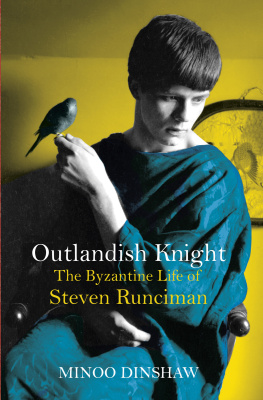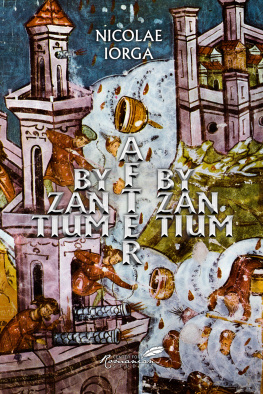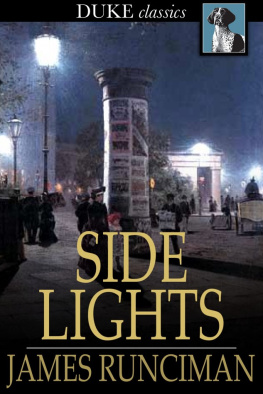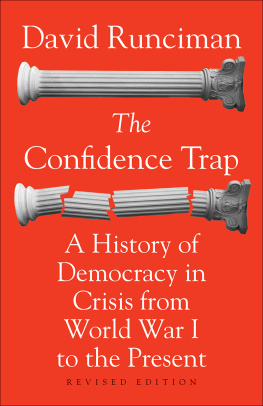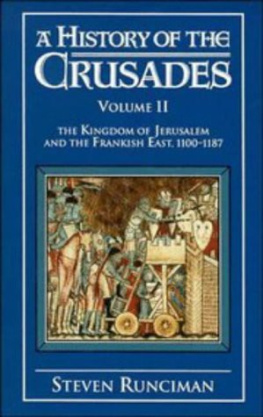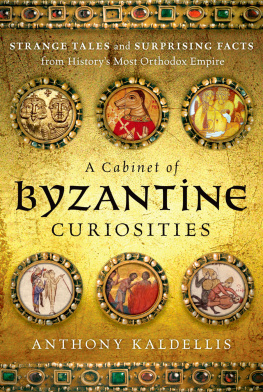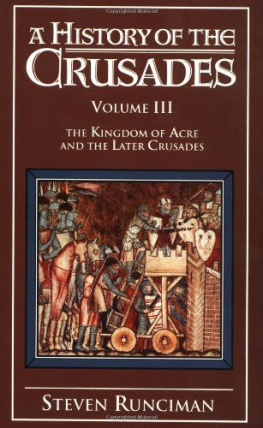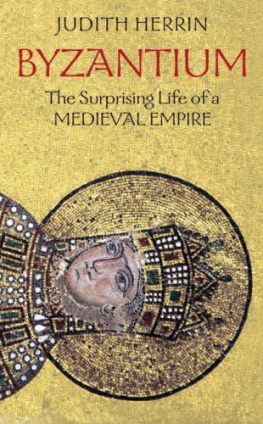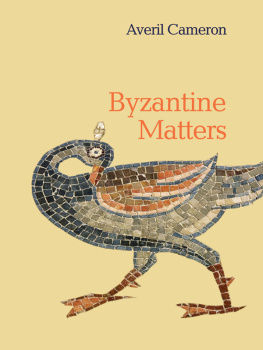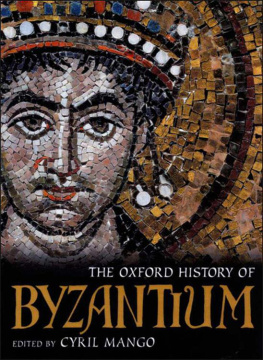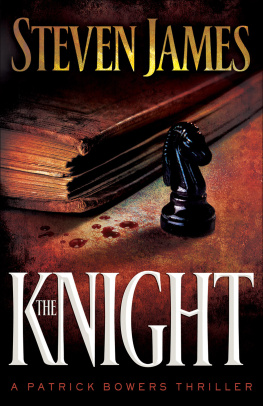Minoo Dinshaw
OUTLANDISH KNIGHT
The Byzantine Life of Steven Runciman
PENGUIN BOOKS
UK | USA | Canada | Ireland | Australia
India | New Zealand | South Africa
Penguin Books is part of the Penguin Random House group of companies whose addresses can be found at global.penguinrandomhouse.com.
First published by Allen Lane 2016
Published in Penguin Books 2017
Copyright Minoo Dinshaw, 2016
The moral right of the author has been asserted
Front cover: Steven Runciman The Cecil Beaton Studio Archive at Southebys
Cover design: Antonio Agnelo Colao
ISBN: 978-0-141-97948-9
For Ann Shukman
An outlandish knight came from the north lands
Traditional folk song
List of Illustrations
Authors Note
Steven Runciman was born just south of the Border but brought up highly conscious of his familys origin to its north. Later on he enjoyed a forty-year relationship with Eigg, one of the Small Isles of the Hebrides, and passed his last three and a half decades in a tower-house on the Scottish West March, complete with a beacon platform to warn of English incursions. Dying in Warwickshire, he was buried in Lochmaben, according to the Scots Presbyterian rite. In the pursuit of his life I came increasingly to locate this playfully elusive figure amongst his Border extraction and allegiances. Lecturing in the still wilder frontier country of Peshawar, Runciman gave it as his opinion that:
Life in a frontier-land, wherever it may be, and whether it is divided by a political boundary or boundaries or none at all, has always some of the same characteristics. Frontier-folk usually show the same tendencies. Their love of freedom is greater than their respect for authority; they admire personal gallantry more than civic virtue; romance and poetry mean more to them than tomes of philosophy and law. (I speak as a frontiersman myself. I was born and brought up on the historic border between England and Scotland on the wrong side of it I grew up among all the legends and traditions that survive there from the good old lawless days.)
As I considered a childhood passed and a retirement spent in the Debatable Land, a title associated with one of the oldest and oddest of the Border ballads collected by Child, The Outlandish Knight, came to mind. It seemed to me to capture Runcimans contradictions, characteristics and enthusiasms with remarkable felicity: his uneasily sceptical attraction to chivalric romance; his preference for the exotic over the parochial; for the multivalent over the monolithic; for the poetic truth over the literal fact, and the organic tradition over the codified doctrine. It was a phrase quite as hauntingly peculiar as the man who had come to preoccupy me. As I reacquainted myself with the ancient ballads actual incidents, the congruence seemed less happy. It tells of a typically grim Border affair, and Steven was no false knight upon the road. But my choice of title seeks after an air, not an analogy; and I feel that the presence in this old song of a parrot in a gilt cage given to tittle-tattle would have appealed to my subjects uncanny sense of humour.

1
The High Priestess
Northumberland, Scotswood 19039, Doxford 190923
She is the Secret Tradition and the higher sense of the instituted Mysteries.
The scroll in her hands is partly covered by her mantle, to show that some things are implied and some spoken.
Arthur Waite, The Key to the Tarot, 1920
Long ago in Northumberland a forest was cleared and a village settled, built out of the most easterly fragments of the Roman Wall, and named for the people Hadrian had debarred. The nineteenth century brought Scotswood prosperity, effective absorption by Newcastle-upon-Tyne, and a large new manor house, West Denton Hall. In 1901 the lease on the house was taken by an ambitious, serious-minded, comfortably circumstanced couple in their early thirties. The wife was a year the elder, the stronger character and more brilliant mind, winner of a first-class degree from Cambridge, though owing to her sex she could not graduate. She had met her husband on one of the newly created Educational Boards, then the only public bodies to which women could be voted by an exclusively male electorate. They had married not long afterwards, and by now had a son; they intended to acquire more children and at least one Parliamentary constituency. Eight years later Hilda Runciman had borne four children and her husband, Walter, had become President of the Board of Education in Asquiths first Cabinet. The family now moved north and into the country, to Doxford Hall. The big house at Scotswood was first turned into an enclosed convent, and then, in 2007, entered its most recent incarnation as the Alan Shearer Centre, a specialist facility for the care of the disabled. Steven Runciman, who was born there in the summer of 1903, did not quite live to hear of this last development, but he would surely have appreciated another transformation so in keeping with the spirit of the age.
For Steven the 1909 move from West Denton and from the loom of the Emperor Hadrian was to prove, however, doubly welcome. He had never warmed to the place as a small child; he remembered it in old age as with huge rooms and a formidable staircase, while the slope outside, at the bottom of which there was a rose-garden, looked like a mountain-side. Though his father showed some perceptiveness in trying to interest his younger son in their house from the historical point of view, Steven found Walters well-meaning stories of Roman carvings hidden in the cellar rather sinister. Doxford, an early product of the distinguished Newcastle neo-classical architect John Dobson, lay further both from the city and from the ghosts of the Wall. The new house carried a reasonable price but a rocky recent history. Its last owner, Henry Percy Warren, had been committed to an asylum after displaying an indecent degree of interest in females of various ages and species. His predecessors, the Browns, had retreated from Doxford amid stories of murdered horses and poisoned wells. No such melodrama was in prospect under the new regime; the Runciman family had become justly proud of cultivating order from unpromising beginnings.
The move was welcome to Steven and his siblings less because of the change of scene than of governess. As at West Denton they were still in the care of their beloved Nannie Laight, whom Steven recalled as Steven would never lose his annoyance with those who tried to teach him what he felt sure he knew in greater detail already. The next governess at the new house never committed this error.
She was named Miss Rebecca (shortened among intimates to Reay or Ray) Fraser Forbes. Her lisping pupils immediately rechristened her Torby. She was quite different from the insubstantial Miss Neligan, being, apart from anything else, a generation older. deal of my life in England, but Im not English. The English are immensely illogical.
in French and German, and was au fait with contemporary painting and sculpture.
Stevens memories make for an instructive contrast with the surviving documents. He does not seem to have known that Torbys real Christian name was Rebecca. He was not far wrong about her birthplace, at Rosehall, a few miles inland from Bonar Bridge and rather less cosmopolitan. But although a fierce High Churchwoman by the time she entered the Runciman household, Rebecca Forbes had, in fact, been born into the ascetic ranks of the Free Church of Scotland (or Wee Frees). Her father, John Forbes, was not a learned university clergyman, but the Rosehall village schoolteacher. Rebecca got her classical education not from him, but through the sponsorship of her maternal uncle, a surgeon in Wark. It was through this uncle, a member of the Edinburgh Royal College of Physicians, that she must have met David Prain. She went to school in Aberdeen, and after a stint as a governess there had saved enough for her brief French and German tour. After her return she had tried her luck in the south, teaching English and classics for some years at a preparatory school in Aldeburgh, where her pupils included the future novelist Theodore Powys.


